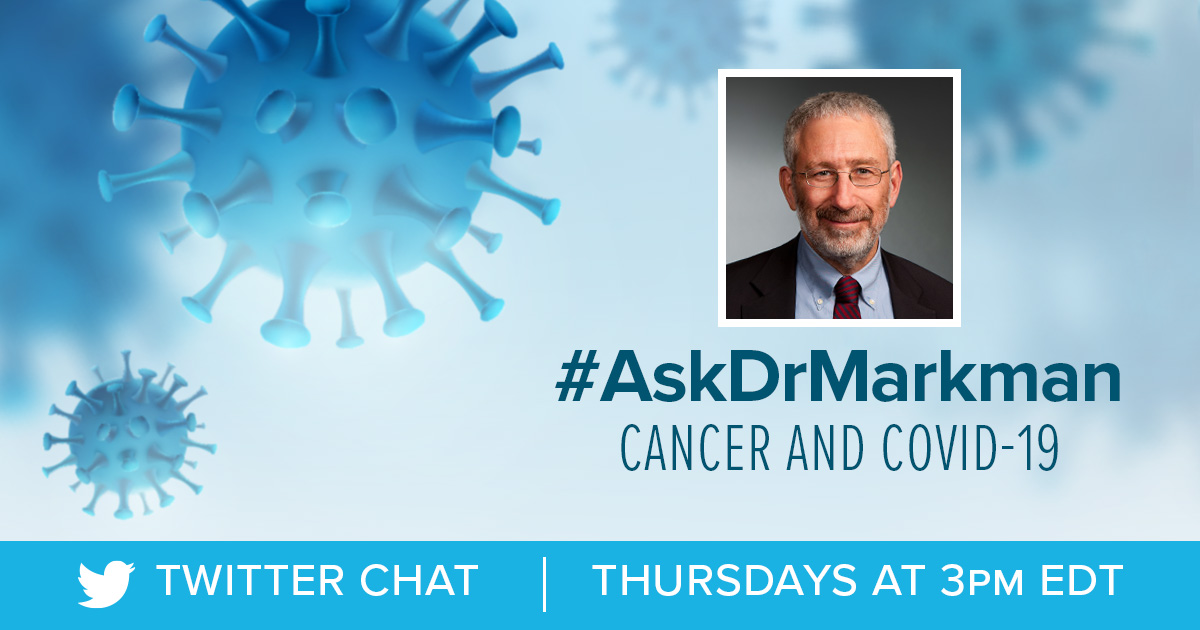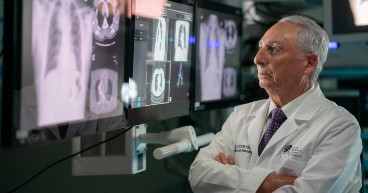
As the COVID-19 pandemic continues, the constant flow of new and evolving information may cause concern and some confusion. Cancer patients have many questions about how COVID-19 may affect them, their treatments and their overall health. In his weekly Q&A hosted on Twitter, Maurie Markman, MD, President of Medicine & Science at Cancer Treatment Centers of America® (CTCA), answers your questions in real time and as questions are sent to us online and by phone. Follow us on #AskDrMarkman. Here’s this week’s chat:
Question: I have bladder cancer, and I’ve received BCG as part of my therapy. Will that prevent me from getting COVID-19?
Answer: There is some limited evidence that people who’ve received BCG to prevent tuberculosis may have a lower risk of contracting COVID-19. But it’s not known if patients who have received BCG as a cancer treatment reduces the risk of COVID-19, though BCG is currently being investigated as one of many possible vaccines against COVID-19.
Learn more about research into BCG as a possible COVID-19 vaccine.
Q: Is it possible to have flu-like side effects several months after receiving BGC? Should I get tested for COVID-19 if my symptoms persist? -- Myrna C.
A: The flu shares some symptoms with COVID-19, such as fever and cough. But flu-like symptoms can be caused by many conditions, including the administration of BCG. If you’re concerned about possible exposure to the virus or side effects of BCG, discuss those concerns with your physician.
Learn more about how COVID-19 symptoms compare to those of the flu, a cold or allergies.
Q: I have two dogs at home. Do my pets raise my risk of developing COVID-19?
A: While there have been a few isolated reports of cats being infected with COVID-19, there’s no evidence those infections have been transmitted to humans. In fact, it’s more likely that the cats developed the infection from their human owners. However, the CDC recommends that cats should be kept indoors when possible and dogs should be walked on a leash, 6 feet from other people and animals.
Q: Can COVID-19 cause cancer or increase the chance of recurrence?
A: There is no evidence that COVID-19 causes cancer or increases the risk of recurrence of a known cancer.
Learn more about research into viruses as a cause and potential treatment for cancer.
Q: Can light-headedness be a symptom of COVID-19? – Mollie D.
A: There are a number of reasons someone might report feeling light-headed, but there’s no reason to believe this symptom by itself is suggestive of infection with COVID-19. The CDC has helpful information on COVID-19 symptoms.
Q: As a cancer survivor, is it safe to be out in public? -- Penny L.
A: Yes, but all members of society should try to carefully follow the recommendations of the CDC and their own local health agencies regarding the important need for social distancing.
Q: I just read a report that remdesivir may be helpful for patients with a serious COVID-19 infection. Does this also include cancer patients who have contracted COVID-19?
A: This report from the NIH regarding a large, well-conducted study of remdesivir in patients with severe infection, while preliminary, is certainly encouraging. At this point in time, there’s no reason to suggest cancer patients wouldn’t also benefit from this treatment, if clinically indicated.
Q: Is it good or bad that experts believe that the number of people who have antibodies to COVID-19 is far higher than the those who experienced symptoms?
A: It’s a good thing. When people test positive for COVID-19 antibodies, it suggests they had previously been exposed to the viral infection, even if they never experienced any symptoms. If a much larger number of individuals in the general population have antibodies than had symptoms, this would suggest the infection may not be as serious as initially feared for the majority of people who contract the virus.
Q: How reliable are the antibody tests used to determine if someone without symptoms had been infected with COVID-19?
A: We don’t know yet. Researchers are continuing their work to develop antibody tests that are specific for COVID-19 infection and can detect the presence of an infection even if the individual had never experienced symptoms of the illness. Of primary importance is the ability to detect antibodies in health care workers, first-responders and others regularly exposed to the public to determine if they have developed some level of immunity to a future infection, and eventually, learn why.
Q: I take an ACE inhibitor to manage my high blood pressure. Do I have a higher risk of serious symptoms if I contract COVID-19?
A: Reported experiences to date indicate that both cancer and high blood pressure appear to be among several risk factors associated with more serious symptoms from COVID-19 infections. However, there’s no evidence to date that ACE inhibitors themselves raise the risk of serious symptoms.
If you’re a cancer survivor or in active treatment and are concerned about how the COVID-19 situation may impact you or your care, please contact your care team.
Learn the do’s and don’ts for supporting a healthy immune system.



